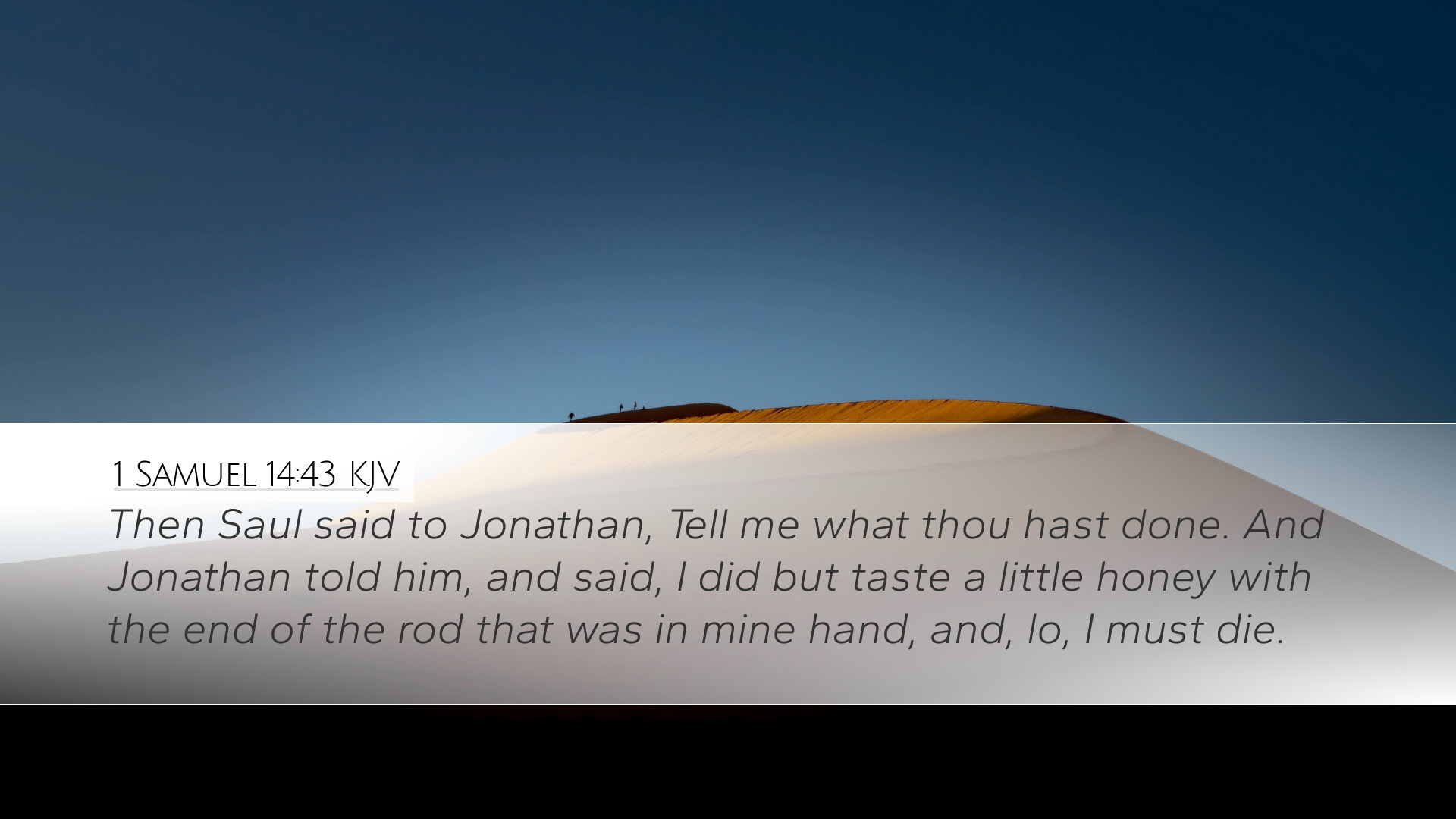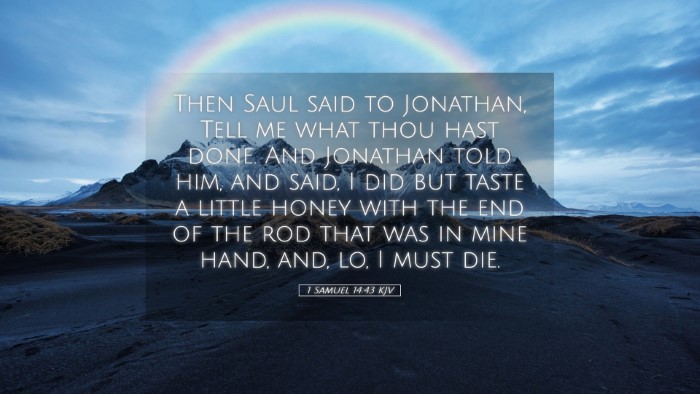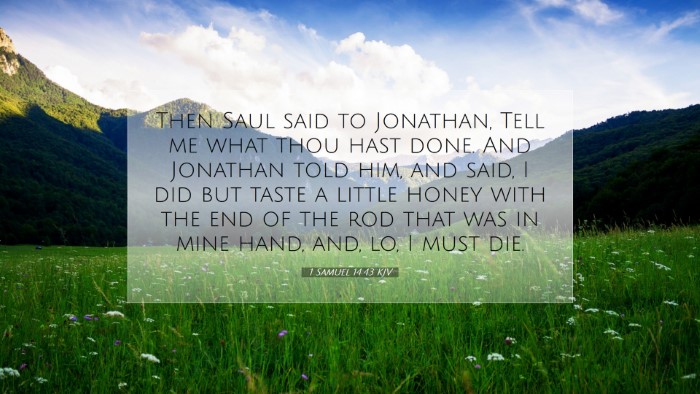Commentary on 1 Samuel 14:43
Verse: 1 Samuel 14:43 - "Then Saul said to Jonathan, 'Tell me what you have done.' And Jonathan told him, 'I tasted a little honey with the tip of the rod that was in my hand. Here I am; I must die!'"
Introduction
This verse is pivotal in illustrating the dynamics of authority, obedience, and the implications of rash vows. Solomon's declaration of Jonathan’s death, based on an oath he had made, reveals not only the severity of Saul's character but serves as a cautionary tale about the consequences of hasty promises.
Contextual Background
The historical context of 1 Samuel is significant. Saul, as the first king of Israel, faced immense pressure from both his enemies and his own people. Chapter 14 narrates a specific event during a critical battle with the Philistines, shedding light on Saul's leadership and decision-making process.
Analysis of Saul’s Oath
Saul made a rash oath during the skirmish against the Philistines, proclaiming that no one should eat until evening. This vow, although stemming from the desire to unify and motivate his troops, was imprudent.
- Rash Vows: Commentators note that Saul’s vow reflects a lack of wisdom and foresight. Both Matthew Henry and Albert Barnes highlight that Saul's covenant was detrimental, causing fatigue among his soldiers and undermining morale.
- Leadership Principles: Effective leadership requires careful communication and consideration of the needs of the led. Saul's decision appears to be impulsive, lacking the foresight expected from a king.
Jonathan’s Defiance and Candidness
Jonathan’s response is characterized by transparency and integrity. When faced with the consequence of his father’s vow, he admits to tasting honey to regain his strength, illustrating the natural human need for sustenance.
- Interpersonal Relationships: Jonathan and Saul's father-son relationship includes elements of respect, but also tension, as Jonathan’s actions contradict Saul’s declaration. Adam Clarke notes that Jonathan’s wisdom surpasses that of Saul in this scenario.
- Moral Dilemma: Jonathan’s predicament poses a moral question regarding obedience to authority versus adherence to natural law. His act of eating honey can be perceived as an intuitive response to hunger, contrasting treachery against his father’s misguided oath.
Implications of Saul’s Reaction
Saul’s immediate response to Jonathan’s admission reflects the complexities of kingship and familial loyalty. His determination to enforce his oath upon his only son represents an extreme adherence to his principles, even at the cost of his son’s life.
- Tragic Heroism: Matthew Henry amplifies the tragic elements of Saul's character. The very qualities that could have made him a great leader—his strictness and desire to uphold promises—become sources of his downfall.
- Authority vs. Mercy: The confrontation between Saul and Jonathan accentuates the essential dichotomy of authority and mercy. Saul’s decision exemplifies a failure to show discernment and mercy in leadership.
Theological Reflections
This narrative encourages scholars and theologians to reflect on the nature of oaths and their potential to bind individuals to disastrous ends. As articulated by Barnes, the verse serves as a theological reflection on the repercussions of poorly considered declarations.
- The Nature of God’s Will: The episode raises questions about God’s will and sovereignty in light of human decisions. While Saul’s desire to commit to his word may reflect a noble intent, it also showcases a misunderstanding of God's grace and forgiveness.
- Role of Conscience: Jonathan’s conscience appears untroubled by his act of eating, indicating an alignment with moral and natural laws despite Saul’s rule. This suggests an essential function of conscience that transcends human authority.
Lessons for Today
This passage serves as a litmus test for contemporary leaders, be they in church or society. Here are several lessons that can be drawn from this encounter:
- Considerate Leadership: Leaders should prioritize the wellbeing of those they serve, understanding that demands placed on their followers should reflect both wisdom and compassion.
- Integrity in Authority: The need for integrity when making commitments is paramount. Words must be measured; otherwise, they can lead to unintended consequences.
- Understanding of Natural Law: Understanding the balance between following authority and the inherent needs of individuals is crucial for holistic leadership.
Conclusion
In summary, 1 Samuel 14:43 encapsulates the conflict between authority and morality, showcasing the consequences of impulsive decisions made by leaders. The contrasting responses of Saul and Jonathan highlight critical elements of leadership, moral integrity, and the importance of balancing oath with compassion. This narrative continues to resonate in theological discourse and serves as a source of reflection for leaders in any context.


